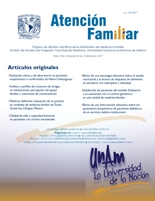Effect of an Educational Strategy on Nutritional Status and Reading of Food Labels in Schoolchildren with Overweight and Obesity
Main Article Content
Abstract
Objective: to evaluate the effect of an educational strategy on nutritional status and reading of food labels in schoolchildren with overweight and obesity. Methods: quasi-experimental study. A strategy for education in reading food labels was applied to 62 school children and who were assessed with a questionnaire before and after the intervention. The questionnaire was validated by experts, its reliability was analyzed by the formula 20 of Kuder-Richardson. Anthropometric measurements and laboratory studies were taken at the beginning and one year after the strategy. The Wilcoxon Test determined the significant difference between the initial and final score of the questionnaire. The McNemar, χ2 and the t Student tests were used. Results: there was a significant difference in the score of the questionnaire before and after the strategy (p<0.05). Favorable changes in nutritional status, adiposity and laboratory studies were obtained (p<0.05). Conclusion: schoolchildren are able to learn to understand the nutritional information with educational programs, which might affect their nutritional status and dietary habits.
Downloads
Download data is not yet available.
Article Details
How to Cite
Barreras Gil, C., Martínez Villa, F. A., & Salazar Gana, C. P. (2017). Effect of an Educational Strategy on Nutritional Status and Reading of Food Labels in Schoolchildren with Overweight and Obesity. Atención Familiar, 24(2). https://doi.org/10.22201/facmed.14058871p.2017.2.59154
